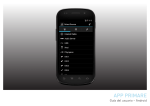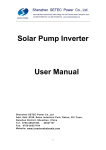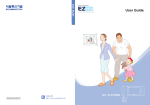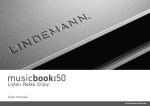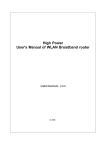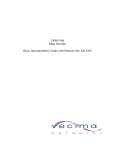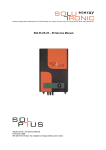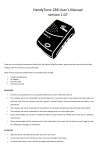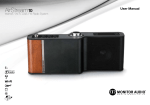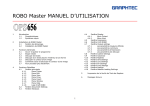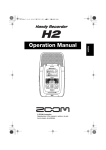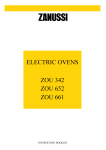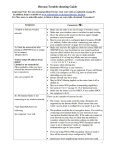Download musicbook:25 Manual
Transcript
1 Listen. Relax. Enjoy. User manual www.lindemann-audio.com www.lindemann-audio.com 2 Welcome Congratulations on your purchase of this device and thank you for choosing a LINDEMANN product. We hope you enjoy listening to music during long evenings with your favorite recordings. With the musicbook series, you have chosen one of the most technologically advanced and best-sounding audio systems. We develop and manufacture our equipment in Germany and have put all our passion and over 20 years of experience into this extraordinary product that leaves no wishes unfulfilled in terms of sound quality. Discover a new quality of music reproduction that easily fills large rooms and puts singers within reach in your living room. Enjoy listening! Your LINDEMANN team Table of contents Scope of delivery 4 ⠸ Source View 20 ⠸ Front view 5 ⠸ Web Radio 21 ⠸ Rear view 6 ⠸ Music Server 22 ⠸ IR remote control 7 ⠸ USB Input 23 ⠸ Connection variants I–III 8 ⠸ My Files 23 ⠸ Favorites 23 ⠸ Network connection 11 ⠸ Digital 1–4 24 ⠸ Network configurations 12 Analog 1–2 24 ⠸ Digital and analog inputs 14 ⠸ CD 25 ⠸ 15 App settings 26 ⠸ CD function ⠸ Settings 16 Technical specifications 28 ⠸ ⠸ Navigation bar 19 ⠸ ⠸ iPod is a trademark of Apple Inc. registered in the U.S. and other countries. This product complies with the directives 2006/95/EC (Low Voltage Directive), 2004/108/EC (EMC Directive), and 2009/125/EC (ErP Directive). © 2013 Lindemann audiotechnik GmbH 3 Important safety information Read this user manual carefully. Carefully observe all NOTES. The manual is designed to help you to properly use your new Lindemann product so that you can enjoy all its features. Keep this user manual for future reference. • • • • • • • Before connecting the device, check to see if your power supply matches the values specified on the type plate. The type plate is located on the bottom of the device. When connecting the device, use the included power cord or another appropriate power cord. Operation without protective grounding is not permitted and is dangerous. Connect the device with a proper power socket and route the cable so that it cannot be crushed or kinked. Make sure that the power cord remains undamaged and constantly accessible. To prevent fire or electric shock, do not expose this device to rain or moisture. The device must not be operated outdoors. Protect the product from dripping or splashing fluids, and do not place any objects filled with water (such as vases) on the product or in its vicinity. As with all electronic devices, liquids should never be allowed to penetrate into product. Do not make any changes to the product or its accessories. Unauthorized changes may compromise safety, regulatory compliance, and proper function of the device. The warranty is voided in such cases. Do not expose the device or the IR remote control to extreme heat, including direct sunlight and fire. Allow waste heat generated during operation to dissipate freely. Never operate the device in closed cabinets or near heat sources such as radiators or stoves. Set up the device so that the back of the device with the power switch is always accessible. Do not use this device unattended. If you will not be operating the device for an extended period of time, turn it off using the power switch on the back or unplug the power cord. If you notice smoke or a burning smell during operation, discontinue using the device immediately by turning off or unplugging the power cable from the power socket. • • • To clean the device, unplug the power cord and clean the surface with a dry cloth or with a little glass cleaner. Make sure that the device is completely dry before you reconnect it with the power cord. Never use solvents (such as acetone or lacquer thinner) to clean the device. Have repair and maintenance work performed by qualified customer service personnel only. Do not try to repair the device yourself. Do not remove or open the device cover; otherwise, you could come into contact with dangerous voltages or be exposed to other hazards. Contact your Lindemann dealer or Lindemann audiotechnik directly to receive qualified customer service. Electronic equipment is not household waste but must be disposed of properly in accordance with Directive 2002/96/EC on electrical and electronic waste. At the end of its useful life, dispose of this device at a designated public collection point. www.lindemann-audio.com 4 Scope of delivery musicbook⠸20/25 ⠸ musicbook 20/25 network music player. The musicbook 20/25 is a streamer (also called a UPnP audio renderer) with integrated preamplifier and CD player*. WLAN antenna ⠸ WLAN antenna for attaching to the back of the musicbook 20/25 (only required on the router with wireless operation). ⠸ Infrared remote control IR remote control with integrated lithium-ion battery, rechargeable. ⠸ LAN cable CAT 6 patch cable (5m) for connecting the musicbook 20/25 to the WLAN router. ⠸ USB charging cable USB charging cable (1m) for charging the IR remote control. ⠸ Power cord Power cord with two-pin grounded plug (2m) for connecting to the power socket. *musicbook 25 only 5 Front view Multifunction control wheel for operating the volume (rotate left/right), muting (briefly press once), stopping the CD* (press and hold once), and ejecting the CD* (press and hold again), ⠸ along with input selection (press and simultaneously rotate left/ right). All other functions can be operated with the included IR remote control and the app. OLED graphic display (optically bonded) ⠸ with a viewing angle of almost 180°. ⠸ Stand-by LED Energy-saving Stand-by: illuminated in yellow. Network Stand-by: pulsating in yellow. ⠸ USB-A port (USB Host) for connecting storage media such as external hard drives or USB sticks. Play directly from smartphones and tablets (Android only). Charging function for tablets and smartphones up to 2.1A (depending on the device). Headphone jack (6.35 mm): analog Class-A amplifier perfect for enjoying music with headphones ⠸ (32–300 ohms). Volume can be controlled via app, IR remote control, and multifunction control wheel. ⠸ High-quality CD player (musicbook 25 only) for playing CDs. High reliability and very low-jitter digital signal. CD-text capable. All CD functions can be controlled via app and IR remote. ⠸ Stand-by button for switching the device on and off. Very low power consumption in operation due to intelligent power supply. The app can be used to select the Stand-by function modes of Energy Saving (0.2W consumption) and Network Stand-by (4W consumption). www.lindemann-audio.com 6 Rear view Balanced (XLR) and unbalanced (RCA) outputs, which can be used independently and simultaneously. Load-stable power output levels for the operation of long cables, for example ⠸ to connect powered speakers or subwoofers. Fixed Line Out (can be turned on in the Settings menu) for fixed output voltage for integration into existing systems. Two analog inputs for connecting a turntable preamplifier or tuner, for example. Fully balanced, analog preamplifier circuit used in professional recording studios ⠸ for precise, balanced volume control for the highest resolution and trouble-free operation even at low volumes. Non-magnetic, gold-plated RCA sockets for optimum signal transfer. Two digital outputs: optical and coaxial. Preprocessed, extremely low-jitter digital signal for connection of external digital components ⠸ such as D/A converters. Digital outputs are switched off in default; they can be switched on in the Settings menu. Four digital inputs: optical and coaxial. Resolution up to 24bit and 192kHz. Connection option for external digital sources, such as TV, tuner, Blu-ray, or external CD drive. Intelligent signal processing with multi-stage, synchronous ⠸ re-sampling and D/A conversion with 32bit and 352.8/384kHz. Sonic scrambling DAC of the last generation with minimum phase apodizing filter. *musicbook 25 only WLAN antenna the wireless connection between the musicbook 20/25 and the WLAN router. ⠸ Playing of music files up to 24bit and 96kHz in WLAN operation. Power switch for completely disconnecting the musicbook 20/25 from the power ⠸ supply. IEC power connector ⠸ for connecting to the power supply. Ethernet LAN connection for operating the UPnP audio renderer on the router (access point). ⠸ Playback of music files up to 24bit and 192kHz in LAN mode. 7 IR remote control LED: Illuminated in yellow in transmission mode, illuminated in red when the battery is charging (goes out when the full charge is reached), ⠸ flashing red if there is a charging error. Stand-by button for switching the device on and off. ⠸ The Stand-by function (Energy Saving or Network Stand-by) can be set in the Settings menu of the app. Settings button for opening the setup menu (Balance, Display Brightness, Digiout, Fixed Line Out, Factory Default). Display button for switching between display of the track, ⠸ artist, or time. ⠸ SET buttons for selecting digital and analog sources. These ⠸ buttons are also the navigation buttons in the Settings menu. OK button to confirm the selection in the Settings menu. ⠸ Mute button for muting the sound. ⠸ ⠸ Info button for the status display of the most important settings. ⠸ Volume buttons for decreasing (Vol -) and increasing (Vol +) the volume. CD function block: musicbook 25 only ⠸ Numeric buttons for direct selection of a CD track. Repeat button for repeating an individual track (one) or the entire ⠸ album (all). Stop/Eject button for stopping the CD by ⠸ pressing the button once and for ejecting the CD by pressing the button again. Search buttons for the forward and backward search function. ⠸ ⠸ Skip buttons for skipping to the next/previous track. ⠸ Play/Pause button for playing and pausing the CD. NOTE: The network functions can be operated via the app. ⠸ USB mini jack for charging the lithium-ion battery. The charging state can be called up with the Info button. www.lindemann-audio.com 8 Connection variant I musicbook⠸20/25 with powered loudspeakers Connection of the powered speakers via the balanced outputs Connection of the powered speakers via the unbalanced outputs Connection variant I: The easiest way to enjoy music with the musicbook 20/25 is to connect powered loudspeakers. You only need a signal cable long enough to establish the connection between the outputs of the musicbook 20/25 and the inputs of the powered loudspeakers. The musicbook 20/25 can easily handle long cables and delivers up to 5V of output voltage at 600 ohms in balanced operation. Thanks to the built-in *musicbook 25 only preamplifier, multiple connection options for analog and digital sources, and the ability to play CDs* or listen to music from a network server or web radio, the music⠸ book 20/25 becomes the center of your hi-fi system. 9 Connection variant II musicbook⠸20/25 with power amplifier musicbook⠸50 + passive loudspeakers musicbook 20/25 musicbook 50 Connection variant II: To operate a passive loudspeaker on musicbook 20/25, you will need a suitable power amplifier. With the musicbook 50, we offer a balanced Class-D power amplifier, which meets the highest requirements for sound. In conjunction with high-quality two-way loudspeakers or small to medium standing speakers, this amplifier delivers the finest in sound with ultra-low power consumption. An intelligent signal detector automatically turns on the amplifier when a music signal is received and off again when no music is being played. But the musicbook 20/25 can also be perfectly combined with existing power amplifiers. Since both outputs can be operated simultaneously, a power amplifier ⠸ and a subwoofer can be connected to the device, for example. www.lindemann-audio.com 10 Connection variant III musicbook⠸20/25 in combination with an existing hi-fi system Connection variant III: If you already have a complete hi-fi system with preamplifier or integrated amplifier, you can connect the musicbook 20/25 to an analog input of the amplifier. To do this, the volume control of the preamplifier can be bypassed in the musicbook 20/25 (menu item uFixed Line Outputt in the Settings menu of the IR remote control) so that it will *musicbook 25 only only work in headphones mode. Thanks to the multiple connection options for analog and digital sources and the ability to play CDs* or listen to music from a network server ⠸ or web radio, the musicbook 20/25 becomes the central source of your hi-fi system. 11 Network connection musicbook⠸20/25 WLAN router Music server (NAS) Control point smartphone or tablet Network connection: The musicbook 20/25 includes a UPnP network player. This allows you to play music from a variety of digital storage media, such as web radio, network storage, and USB sticks / hard drives. For operation in the network, you need a WLAN router, a smartphone or tablet (control point) with the free musicbook app, and a storage medium such as a NAS (Network Attached Storage). The versatile functions of the musicbook 20/25 are easy to use in the app. ⠸ www.lindemann-audio.com 12 Network configuration musicbook⠸20/25 In the following sections, we assume that a working home network with a WLAN router and an Internet connection exists. In order to ensure smooth operation of the musicbook 20/25 in a local network, please follow the instructions in this chapter step by step. If you nevertheless experience difficulties, please contact a network specialist or your Internet provider. NOTE: Even if you are only planning to use wireless operation via WLAN, it is nevertheless necessary during initial startup to connect the musicbook 20/25 to the router using a LAN cable. This is the only way that the WLAN access data can be entered. Once this is done, the LAN connection can be disconnected and you can switch to WLAN operation. 4. If the status Con: Yes (Connected: Yes) appears, the musicbook 20/25 is connected to the network. 5. Now start the musicbook app on your control point (smartphone or tablet). Connecting to the network 1. Connect the musicbook 20/25 to a free LAN port on your WLAN router using the supplied LAN cable. 2. Now switch on the musicbook 20/25. 3. Press the uINFO buttont on the IR remote control. You can check the status of the network in the middle column of the display. *musicbook 25 only 6. The app shows you all available musicbook devices with the respective IP addresses and device names. 7. Touch the desired musicbook . 13 Network configuration musicbook⠸20/25 Wireless connection via WLAN 4. Select uConfigure WiFit. To configure the WLAN connection, it is necessary that the above steps first be performed. When you begin the process, the musicbook 20/25 must still be connected to the router via the LAN cable. 5. Select uSSIDt. 6. Choose your home network among the networks found. 7. If unknown is displayed under Security, the wireless encryption was not automatically detected. Select the WLAN encryption you set on the WLAN router (for example, WPA2). 1. Select the Settings icon in the app. 8. Select uPasswordt and enter the password for your WLAN access. Settings u 9. Confirm with uApplyt. Discover Devices 2. Select uDevice Settingst. Application Settings Device Settings 11. The musicbook 20/25 now establishes a WLAN connection. About 12. Disconnect the LAN cable from the musicbook 20/25 NOW. Device Settings u Device Name Network 3. Select uNetworkt. 10. Also confirm the IP setting (DHCP) with uApplyt. Sound UPnP Control Energy Saving Software 13. Switching to WLAN requires about 20–30 sec. 14. Check the WLAN connection by pressing the INFO button control. on the IR remote 15. If the WLAN connection is correct, WLAN will be displayed under Act (Active Interface). If LAN is displayed, switch off the musicbook 20/25, make sure that no LAN cable is connected to the musicbook 20/25, and boot the device again. www.lindemann-audio.com 14 Selection of digital and analog inputs musicbook⠸20/25 With the musicbook 20/25, 4 digital and 2 analog inputs are available to you. They can be selected in three different ways: • Using the musicbook App • Using the IR remote control • Using the multifunction control wheel on the musicbook 20/25 Selection via the app • • • • Start the musicbook app. Go to the Source View and then select Digital 1–4 or Analog 1–2. Once you have selected the source, the app takes you to the Play View. You can use the app to change the names of the digital and analog inputs. See p. 24. *musicbook 25 only Selection using the IR remote control • • On the IR remote control, press the SET up or SET down buttons until the desired input appears. The display and the app simultaneously show you the selected inputs. Selection using the multifunction control wheel • • Press in the middle of the multifunction control wheel on the musicbook 20/25. Press and hold down the control wheel while turning it to the left or right. The display shows the inputs Digital 1–4 and Analog 1–2, from which you can select. 15 CD function* musicbook⠸25 • Carefully insert an audio CD with the printed side facing up into the slot of the CD drive until the CD is automatically drawn in. • After a few seconds, the display will show the number of tracks and the total playing time of the CD. • For further operation, you can use the IR remote, the app, and the multifunction control wheel on the device. Operation with app and IR remote control • Play/Pause. • Search (IR remote control). • Search/Skip (app). • Skip (skip to the next or previous track). • • By pressing the display button on the IR remote control, you can switch the display between Track/ Playtime, Title, and Artist (IR remote control only). Operation with the multifunction control wheel • Volume control (rotate left/right). • Mute: briefly press once. Repeat one (repeat a track). • Stop the CD: press for > 1 sec. • Repeat all (repeat the entire album). • Eject the CD: press for > 1 sec. again. • Volume (- / +). • Mute. • In the Source View of the app, on the CD line you also see the icon for CD eject (app). www.lindemann-audio.com 16 Settings musicbook⠸20/25 • • Settings The Settings menu of the musicbook 20/25 can be opened by pressing the Settings button on the IR remote control. Display • Press the Settings button on the IR remote control. The following appears on the display. • Select uDisplayt with the SET buttons SET up and SET down. • Confirm with the OK button. • Use the SET buttons SET up and SET down to select uHight for high brightness and uLowt for low brightness. Confirm with the OK button. In this Settings menu, you can change the settings for Balance, Display, Digiout, Fixed Line Out, and Factory Default. In the Settings menu, you have two display brightness levels to choose from. Balance Digiout The balance function is used to regulate volume differences at the listening position if this position is not in the optimal location for sound. For this purpose, different volume levels can be set for the left and right loudspeakers. To reduce interference sources, the two digital outputs (optical and coaxial) are switched off in the factory. They can be turned on and off again in the Settings menu. • Press the Settings button on the IR remote control. • Use the SET buttons SET up and SET down to select Balance. • Confirm with the OK button. • Use the SET buttons SET up and SET down to select the desired range for the left or right loudspeaker. Confirm with the OK button. *musicbook 25 only • Press the Settings button on the IR remote control. • Use the SET buttons SET up and SET down to select uDigioutt. • Confirm with the OK button. • Use the SET buttons SET up and SET down to select uOnt to turn on the digital outputs and uOfft to turn off the digital outputs. Confirm with the OK button. 17 Settings musicbook⠸20/25 Fixed Line Out Factory Default In the event that you want to include the musicbook 20/25 in an existing system with its own amplifier and volume control, it is recommended that you bypass the volume control of the musicbook 20/25. This is made possible by the Fixed Line Out function. There is then no volume control on the musicbook 20/25; in such a case, volume is controlled on the amplifier connected to the musicbook 20/25. The volume control for the headphone output can continue to be used. The musicbook 20/25 can be reset to factory settings using the Factory Default function. This causes all settings made to be irrevocably deleted. • Press the Settings button on the IR remote control. • Use the SET buttons SET up and SET down to select uFixed Line outt. • Confirm with the OK button. • Use the SET buttons SET up and SET down to select uOnt to activate the Fixed Line Out function and uOfft to deactivate the Fixed Line Out function. Confirm with the OK button. • Press the Settings button on the IR remote control. • Use the SET buttons SET up and SET down to select uFactory Defaultt. • Confirm with the OK button. • Use the SET buttons SET up and SET down to select uYest to reset the device to the factory defaults. Confirm with the OK button. NOTE: If you use the musicbook 20/25 without integration into an existing system – that is, the musicbook 20/25 with powered loudspeakers or the musicbook 20/25 with power amplifier and passive loudspeakers – the Fixed Line Out function must be set to Off, since the maximum output voltage could otherwise cause severe damage to the loudspeakers. The Fixed Line Out function is turned off by default. www.lindemann-audio.com 18 The musicbook App musicbook⠸20/25 The musicbook app is available for devices with the Android or iOS operating system. You can download the Android app from Google Play and the iOS app from the App Store. In the respective store, enter “musicbook” in the search field and select the app musicbook Lindemann audiotechnik. To install, follow the instructions in the online store as well as on your smartphone or tablet. The apps differ from each other slightly in their appearance. You can see the differences in the graphic below. Furthermore, deviations may occur depending on the size and resolution of the display as well as the version of the operating system used. tNavigation bar tNavigation bar iOS NOTE: To avoid graphical and system-related problems with the app, we strongly recommend that you always use the latest version of the operating system for your smartphone or tablet. The musicbook app runs on the iOS operating system version 6 and and higher *musicbook 25 only Android and on the Android operating system version 2.3 and higher. In this user manual, the display of the Android version is used to explain the app. All descriptions also apply to iOS devices. 19 The musicbook App Navigation bar The home screen of the app Source View tNavigation bar Source q Browse q Play q Settings q In the Source View, you can always go back to the view shown on the left, in which sources can be selected. Browse View tSources • Web Radio • Music Server • USB Input • My Files • Favorites • CD* • Digital 1–4 • Analog 1–2 In the Browse View, the folder structure of the source is displayed, in which it is possible to navigate. The Browse View shows the folder structure with all its levels and is dependent on the source. You navigate within the Browse View by selecting the appropriate folder and by using the Back function in the upper left corner of the app to go back to the next higher level in the folder structure. Play View When playing music in the Play View, the current track is displayed, and when you are playing from web radio or a music server, the cover/station logo also appears. Touching the cover will give you a list of the following additional information, depending on availability: Track, artist, bit rate, format, sample rate. In the Play View of the digital and analog inputs (Digital 1–4, Analog 1–2), the input name is displayed. With digital inputs, the current sample rate is also displayed. You can at any time switch between Source View, Browse View, and Play View; the title that is playing continues to play while you are doing this. Settings The device settings can be changed under Settings (see p. 26). www.lindemann-audio.com 20 The musicbook App Source View You can select the following sources in the Source View: *musicbook 25 only t Web Radio With the musicbook 20/25, you have the option to choose from several thousand national and international web radio stations. This only requires that the WLAN router to which you musicbook 20/25 is connected is connected to the Internet. t Music Server Here you select the UPnP server from which music should be played in your home network. In your home network, you can simultaneously connect multiple UPnP servers that can all be operated using the musicbook app. t USB Input Using the USB-A port of the musicbook 20/25, songs from external storage media such as USB sticks or USB hard drives can be played. t My Files With My Files, you can play locally stored music files on your smartphone or tablet. t Favorites In Favorites you can create a list of your favorite songs and web radio stations. t CD* If there is a CD in the drive, the title of the CD text is displayed. t Digital 1–4 Here you can select the external digital sources connected to the musicbook 20/25. t Analog 1–2 Here you can select the external analog sources connected to the musicbook 20/25. 21 The musicbook App Source View Web Radio In the Browse View, you have different criteria available for selecting web radio stations. Navigation through the folder structure is shown below as an example. Web Radio u Favorites Bayern Plus Music Server Recent Launches GrooveFM USB Input My Added Stations FFH Digital – Jazz My Files Local Germany DELUXE RADIO Stations By Genre Coolradio Jazz Stations By Location Acid Jazz Radio New Stations Electro Swing Favorites CD* Digital 1 Digital 2 Digital 3 Digital 4 Most Popular Stations u lautFM If you press the Display button on the IR remote control, the display switches between station and info. The contents of the source Web Radio are provided by the service provider vTuner. The radio stations and lists are transmitted over the Internet. Using the link http://lindemann.vtuner.com/setupapp/lindemann/asp/AuthLogin/SignIn.asp you have the option to set up the Favorite list and My Added Stations as you would like. To do this, you need to log on to the above website with e-mail address, password and ID number. The ID number of your musicbook 20/25 is the last entry on the Web Radio Browse View. ....... ID#0011F6A739XXXX Analog 1 Analog 2 WARNING: For the Web Radio service, you need to have a flat-rate Internet data plan, since you could otherwise incur high costs. www.lindemann-audio.com 22 The musicbook App Source View Music Server To be able to use the musicbook 20/25 as a network player, your digital music archive must be stored on a UPnP server connected on the same home network as the musicbook 20/25. In general, this task is performed by a NAS (Network Attached Storage) with a music or media server. If you want to use your PC or Mac as a network server, UPnP software must Web Radio UPnP Server1 u Artist / Album u Music Server u UPnP Server2 Album USB Input UPnP Server3 Title My Files My Android Composer ....... Genre Favorites CD* Digital 1 Digital 2 Digital 3 NOTE: It's important to note that the Browse View only displays the folder structure of the UPnP server. This has the consequence that the views in the Browse View are not uniform, but vary. Sorting of the music according to specific criteria such as albums, genre, artist, lists, alphabetical sorting, etc., is thus dependent on the UPnP server. For this reason, the views of the folder structure shown here as examples can differ from the view on your device. Style Dynamic Browsing Internet Radio Playlist Digital 4 Advanced Search Analog 1 ....... Analog 2 ....... *musicbook 25 only be installed on it. Programs such as TwonkyServer or Asset, which are available for download on the Internet for a fee, can be used for this. If you press the Display button on the IR remote control, the display switches between Title and Artist. 23 The musicbook App Source View USB Input My Files Favorites USB Input The USB-A port allows you to play music files from USB sticks, USB hard drives, or portable MP3 players. In the Browse View, you can navigate through the folder structure and select the desired title. Using the Back function in the upper left corner of the app will take you back up to the next higher folder level. My Files With My Files it is possible to access the music files that are on the smartphone or tablet that operates the musicbook 20/25. In the Browse View, you can navigate through the folder structure and select the desired title. Using the Back function in the upper left corner of the app will take you back up to the next higher folder level. Favorites Favorites contains the list of songs, albums, web radio stations, and web radio folders marked by you as Favorites. If you select a song or a web radio station from the Favorites list, it will be opened immediately and the app will switch to the Play View. If you mark an album, folder, or server as a favorite, you will be taken to the corresponding view of the Browse View and can navigate from there. Marking favorites on Android devices: The Favorites icon is in the upper right corner of the Play View of the Android app . If you touch this icon, a window opens with the options uAdd to Favoritest and uAdd to Favorites at Positiont. If you select uAdd to Favoritest, this title is added to the Favorites list in the last position. If you select uAdd to Favorites at Positiont, you can store the track at any point in the Favorites list. The same applies for adding web radio stations to your Favorites list. Folders or albums can also be added to the Favorites list. To do this, press and hold the selected object (the Jazz folder, for example) for approx. 1 sec. A window opens with the options uAdd to Favoritest and uAdd to Favorites at Positiont. You can proceed as described above and add the folder or album to the Favorites list. Marking favorites on iOS devices: The icon for Favorites is on every line in the Browse View . . In the Play View, the icon is at the top right. If you touch this icon, a window opens with the options uAdd to Favoritest and uAdd to Favorites at Positiont. If you select uAdd to Favoritest, this title is added to the Favorites list in the last position. If you select uAdd to Favorites at Positiont, you can store the track at any point in the Favorites list. The same applies for adding web radio stations to your Favorites list. www.lindemann-audio.com 24 The musicbook App Source View Digital 1–4 Analog 1–2 Four digital inputs The four digital inputs (2 x optical, 2 x coaxial) offer connection options for digital sources such as TV, DAB tuner, Blu-ray, or an external CD drive. Renaming the digital and analog inputs with iOS devices: In the Source View, the Rename icon is displayed next to the digital/analog inputs on the right side. Touching this icon opens a window where you can rename the source, e.g., TV or Tuner. Confirm with uDonet in the menu bar at the top left or with uReturnt. Two analog inputs The two analog inputs offer connection options for analog sources such as tuners or turntable preamplifiers. Renaming In the factory, the names of the inputs for the external digital and analog sources are set to Digital 1–4 and Analog 1–2. These can be changed individually. Renaming the digital and analog inputs with Android devices: Press and hold the line of the input for approx. 1 sec. This opens a window where you can rename the digital source, e.g., TV or Tuner. Confirm with OK. *musicbook 25 only In the Source View, the input is shown with the new name. 25 The musicbook App Source View CD* In CD Browse View*, all titles on the CD are listed. If you select a track, the app goes back to the Play View, and the selected music file is played. NOTE: With CDs with CD text information, this information is displayed in the Browse and Play View. To eject a CD, press it in the Source View. www.lindemann-audio.com 26 The musicbook App App settings You can open the App settings using the icon . The following options are available for selection: | Discover Devices | Application Settings | Device Settings Discover Devices • Discover Devices displays all musicbook 20/25 devices available on the network. If several devices are displayed, you can select the one you want here. Application Settings • • • Autoconnect This function allows you to automatically connect to the last musicbook device used. If this function is disabled, all musicbook devices found are listed in the menu item Discover Devices, and you need to select the device manually every time you start the app. Show Album Art If available, the App shows album covers. To enable faster access to music files, this function can be varied or turned off. ¡ Always: The cover is always displayed. ¡ Directories and Internet Radio: The cover is not displayed in the track ¡ lists. ¡ Never: No covers are displayed. Play My Files If this function is activated, music files that are stored on a smartphone or tablet can be played. *musicbook 25 only Cache The app collects data in the cache to speed up navigation. This is mainly album covers. Once this data is loaded, the page can be displayed much more quickly if it is called up again. If you change the UPnP server, or if problems occur when displaying images, it is recommended that you clear the cache. ¡ With Android devices: uClear Cachet needs to be pressed. ¡ With iOS devices: uPurget needs to be pressed. Device Settings • Device Name The network name musicbook can be changed. In the menu item Discover Devices, your musicbook then appears with the newly assigned name. • Network Here you can view current network information. ¡ Configure LAN/WLAN (see network configuration, p. 12). • Sound ¡ Balance The balance function is used to regulate volume differences at the listening position if this position is not in the optimal location for sound. For this purpose, different volume levels can be set for the left and right loudspeakers. The balance adjustment range is ±6 dB. ¡ App Volume Limitation This function allows you to limit the maximum volume that can be set with the app. Drag the volume scale (0 to 99) to the desired value. The App Volume Limitation can be switched off. 27 The musicbook App App settings • UPnP Control The musicbook 20/25 is a UPnP-compliant network player and can be controlled from any UPnP control point software. UPnP control support can be turned off. • Energy Saving The Energy Saving function reduces Stand-by power consumption to 0.2 W. In Energy Saving mode, it is not possible to turn on the musicbook 20/25 directly in the app. • Software In this view, you can view information about the software version. If you press uCheck for Updatet, the app searches for software updates on a USB stick or on the Internet. ¡ USB If you have saved an update on a USB stick, proceed as follows: 1. Insert the USB stick into the USB-A port on the front of the musicbook 20/25. 2. Select uCheck for Updatet. 3. Select uUSBt. 4. Select uStart Updatet. ¡ Internet Firmware updates for the musicbook 20/25 are provided on the Internet at certain intervals. If you select uCheck for Updatet and then uInternett, the app checks for updates. If an update is found, it is displayed and you can press uStart Updatet. Follow the instructions of the app. The process can take several minutes to complete. NOTE: This function requires an Internet connection to be available. The following appears on the display of the musicbook 20/25 NOTE: Do not switch off the musicbook 20/25 under any circumstances during the update process. About Here you can find information about the app version. The process can take several minutes to complete. NOTE: During this process, do not switch off the musicbook 20/25 under any circumstances. www.lindemann-audio.com 28 Technical specifications musicbook 20/25 Overview Full metal housing (6.5 mm wall thickness) with high-quality multifunction control wheel. Monochrome, optically bonded OLED display with nearly 180° viewing angle. High-quality, gold-plated connectors for the audio signals. 6-fold multi-layer printed circuit board. Highest quality SMD components such as close-tolerance metal film resistors and film capacitors. Preamplifier CD drive* Fully balanced, analog preamplifier circuit used in professional recording studios. Highly accurate, balanced volume control. Separately designed output stages for balanced and unbalanced output. Both outputs can be used simultaneously. Premium slot-in CD drive (Teac). Plays CDs and CD-Rs. Compatible with CD text. The CD player can be remote controlled via IR remote control and app. Network player Headphone amplifier Analog Class-A amplifier circuit with high-current output stages for excellent sound quality. Headphone volume can be adjusted separately from the outputs. Recommended impedance range of the headphones: 32–300 ohms. Headphone volume can be remotely controlled. UPnP/DLNA-compatible audio renderer with control point apps for iOS and Android. Support for HD formats, metadata and gapless playback. Network connectivity via LAN and WLAN. Wireless playback of local music files from smartphones or tablets using the “My Files” function. IR remote control Digital/analog converter Fully balanced D/A converter that operates in dual-differential mono mode. Modified anagram sonic scrambling (S²) DSP architecture with re-sampling to 352.8 or 384kHz (depending on the input signal). Minimum phase digital filter with apodizing behavior. Three-stage synchronous re-sampling and high-stability master clock (0.25 ps) with balanced clock lines (LVDS) provide extremely high suppression of input jitter. *musicbook 25 only High-quality metal remote control with acrylic glass cover. Integrated lithium-ion battery that can be charged on the device. Controls all functions except the network player. 29 Technical specifications musicbook 20/25 Detailed technical specifications (measuring conditions: 230 V, 50 Hz, 20°C) • • Supply voltage range: 100–250V, 50–60Hz. Dimensions: 280 x 220 x 65mm (W x D x H). • • Weight: 3.50kg (musicbook 25) | 3.30kg (musicbook 20). Power consumption: 0.2W Stand-by, 4W Network Stand-by, 30W maximum. (Subject to technical changes! Measurement data are typical values.) Network player Preamplifier • • • • • • • • • Ethernet: 10/100Mbit/s. WLAN: 802.11b, g, n. 2.4GHz band. WEP, WPA, WPA2 security support. External screw antenna. DHCP and static IP support. USB 2.0 host interface: Full-speed and high-speed mode. Charging of smartphones and tablets up to 2.1A. Support for mass storage devices with FAT16/32 file systems, such as USB sticks, USB hard drives, smartphones, and tablets. Internet radio: vTuner. Gapless playback with WAV, AIFF, FLAC, ALAC, MP3. Metadata support Supported formats: MP3 up to 320kbit/s VBR/CBR | WAV and AIFF up to 192Hz / 24bit | FLAC up to 192kHz / 24bit | ALAC up to 96kHz / 24bit | AAC | Ogg Vorbis | WMA (Standard only, no Pro and Lossless). D/A converter • • • • • • • • • • • • • • • • • Inputs A1, A2: analog line-level inputs (RCA) with an input impedance of 10kilohms. Outputs: a balanced (XLR) and unbalanced (RCA) line-level output with output impedance of 100 ohms and a maximum level of 2.50V (unbalanced) and 5V (balanced). Headphone connection: 6.35mm jack for connecting headphones with 32 ohms to 300 ohms impedance. Volume control range: 0….99 with the following characteristic: 0….20 in 2dB steps | 21…70 in 1dB steps | 71….99 in 0.5dB steps. Balance control range: ±6dB in 1dB steps. Maximum gain: 14dB (5 times). Volume setting for 0 dB gain: 70. Fixed Line Output (FLO) corresponds to 0dB gain (70), output voltage 2.50V @ 0dBFS. Frequency response: 0–200kHz (-3 dB). THD & noise: < 0.0005% @ 2.50V output. Inputs D1, D2, D3, D4: two optical and two coaxial digital inputs (75 ohms) for SPDIF signals (LPCM) up to 192kHz and 24bit. Outputs: one optical and one coaxial digital output (75 ohms) for SPDIF signal. Sample rate output = sample rate input. THD & noise: < 0.0005% (@ 0 dBFS). Dynamic range: > 125dB. Resolution: 352.8 / 384kHz, 32bit. Digital filter: Minimum phase filter with “apodizing” characteristic. Output voltage: 2.50V @ 0dBFS. www.lindemann-audio.com 30 Listen. Relax. Enjoy. USB audio music player with DSD playback balanced class D power amplifier USB audio music player with DSD playback & CD drive 31 www.lindemann-audio.com Lindemann audiotechnik GmbH 82152 Krailling Germany Tel.: +49 (0) 89-891 36 79-0 Fax: +49 (0) 89-891 36 79-29 [email protected] 01.2014



































